As the lockdown period in the UK continues, the majority of businesses across the country have been forced to switch to remote working practices for their employees.
The short term disruption this has caused was almost inevitable, with many businesses having been sceptical about the prospect of their employees remote working on a regular basis. In many cases, this caused logistical headaches for businesses that needed access to additional tech to make their move to remote working smoothly. Across the UK, employers have been scrambling to ensure their employees are set up with laptops, phones and sufficient data privacy provisions.
With millions of the country’s workforce now settled (or settling!) into new routines, this period will be pivotal to the amount of UK businesses adopting remote working practices moving forwards. Not only because of the benefits to staff, but also the potential financial benefits through reduced overheads such as office space, energy costs and more.
Why are we doing this report?
We wanted to find out which cities and industries were the most prepared for this long term practical and cultural shift and which will need to catch up after staff and employers realise the potential benefits of home working.
Over the past few years, we have heard numerous discussions amongst business leaders about the rise of remote and flexible working, the capabilities of a four-day working week (with some businesses already making great strides to bring some of these measures in already). However, the lockdown in the wake of Covid-19 has forced employers to, in effect, trial this new way of working. There is no doubt the implications of this way of working during this period will be felt years down the line.
How did we collect the data?
We wanted to get a picture of the state of play when it comes to way some of the UK’s biggest employers view remote and flexible working and to do this we reviewed 20 UK major cities and took a look and ten biggest employers in each respective location.
Using indeed.co.uk and company job descriptions, we then used content and thematic analysis to analyse thousands of employee reviews to establish what the biggest employers in each city and industry are really offering in terms of flexible working to ultimately depict who, before the lockdown at least, was ready for flexible working and who is not.
In order to paint a thorough picture of all aspects of flexibility to working, we decided to look at both “remote working” and “flexible working” practices specifically. Remote working rating scores were based on the ability of employees to work outside of their office environment. While, for flexible working, the rating is based on hours, analysing how employees are able to alter their start and finish times to suit their needs.
To identify the most flexible working industry and city in the UK, we took a look at the ten biggest employers in each of the 20 UK cities to gather and analyse thousands of employee reviews and company job descriptions.
Pulling out key themes, we then used the below rating scale to measure the remote and flexible working offerings of employers within the UK, using these key themes to put a score for each category out of five.
| 1 | Poor reviews and inflexible, sometimes long hours |
| 2 | Negative reviews and complaints on flexibility |
| 3 | Average mixed feedback |
| 4 | Mostly positive reviews of flexibility |
| 5 | Outstanding flexibility offered to employees |
We used indeed.co.uk reviews to gather an accurate insight of how flexible employees perceive their job role to be, as well as cross analysing this data with company job profiles. This gave us a more accurate representation of each industry and city, rather than producing a one-sided summary.
By assessing both the flexible and remote working opportunities, we were able to use multiple checks for each city and industry to give an overall fair score and an indication of the remote and flexible working environments in the UK.
The results by region
Remote working rating by city
The remote working rating of each city was scored on the ability of employees to work outside of their regular working environment.
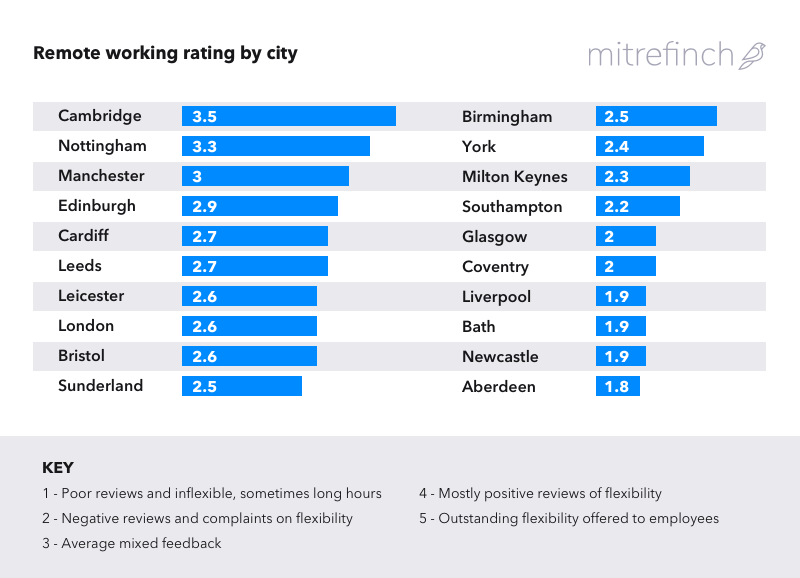
Most Opportunities: Cambridge, Nottingham, Manchester
The city of Cambridge scored the highest for remote working opportunities in the country. With the largest employers in Cambridge including pharmaceutical firms Astrazeneca and Multipharma, the city received the most positive praise for remote working according to reviews.
Scoring second for remote working was Nottingham which is home to a high number of financial firms including Capital One and Experian as well as household names such as Boots. Employees at these firms reported positively on their work-life balance and freedom to work outside of their offices.
Commenting on the remote working opportunities in the city, Aaron Dicks, founder of Nottingham-based Digital Marketing company, Impression said,
“The number of remote working opportunities in Nottingham is growing rapidly, with a range of flexible technology firms starting up in the city centre. We believe that allowing employees to work remotely allows them to harness their productivity and give them the freedom to plan their days as they wish.
“Remote working is about having the right equipment and building trust with your team, something we are working hard to achieve here in Nottingham.”
Manchester completed the top three, where it’s host of technology firms with offices in the city performed particularly well.
Fewest Opportunities: Aberdeen, Newcastle, Liverpool
At the other end of the spectrum, it was Aberdeen where staff had the fewest opportunities to access remote working.
Unsurprisingly, a high proportion of oil companies were identified in featured in this research which contributed to the low remote working score the Scottish port city received. The oil and gas industry currently falls behind other industries for remote working opportunities.
According to Dr Alix Thom, Workforce Engagement and Skills Manager of Oil & Gas UK, advancements in technology such as increased digitisation, are planned to create more remote working opportunities in the industry. By creating new innovations, the future workforce of the oil and gas industry will be able to harness these opportunities to widen the remote scope of their work through the use of fleet-management solutions and sophisticated communication systems.
Also fairing not so well in the ratings for remote working was Newcastle and Liverpool, both of which hold an industrial heritage. A larger proportion of retail companies were also found in Liverpool in comparison to other cities, contributing to the lower ranking of the city since many employees felt unable to complete their job remotely.
Flexible working rating by city
The flexible working rating for each city was based on hours, analysing how employees are able to alter their start and finish times to suit their needs.
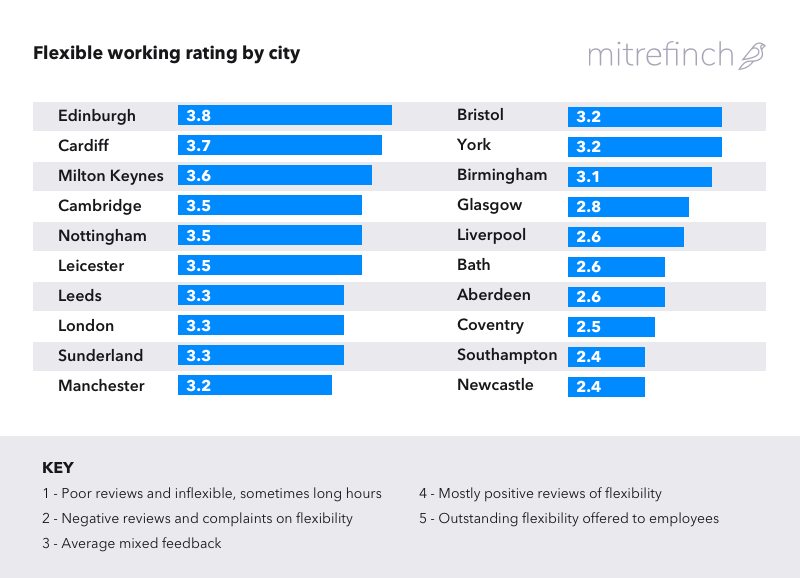
Most opportunities: Edinburgh, Cardiff, Milton Keynes
With a large proportion of banking and insurance companies in the city, Edinburgh received the top score for flexible working in the UK, with the highest average of 3.8 out for 5.
Cardiff followed the Scottish capital, with the financial firms in the city boosting the score positively for their flexible working offerings. It would be interesting to dive deeper into the specific resources and technology that is allowing these types of firms in particular that facilitate these ways of working.
Milton Keynes completed the top three with some of its biggest employers including the head offices for Argos and Domino’s Pizza fairing particularly well in the research.
Fewest opportunities: Newcastle, Southampton, Coventry
At an average flexible working score of 2.4 out of 5, it was Newcastle’s biggest employers that were found to be most restricted in terms of flexible working hours.
While some of the city’s biggest employers including Greggs and Sage performed significantly well in the research, it was a number of other organisations operating across a range of sectors including retail and property that brought the average down.
Southampton also had similar issues when it came to retailers presenting staff with fewer opportunities to access flexible hours, as employees in head offices based in the city reported.
Third from the bottom was Coventry, where employees from the retail and automotive firms in the city reported inflexible working practices. However, technology firms including IBM did fair well in the research.
Overall rating and ranking by city
Combining the flexible and remote working scores for each city, we were able to gain an overall total and understanding of the top city in the UK for flexible and remote working.
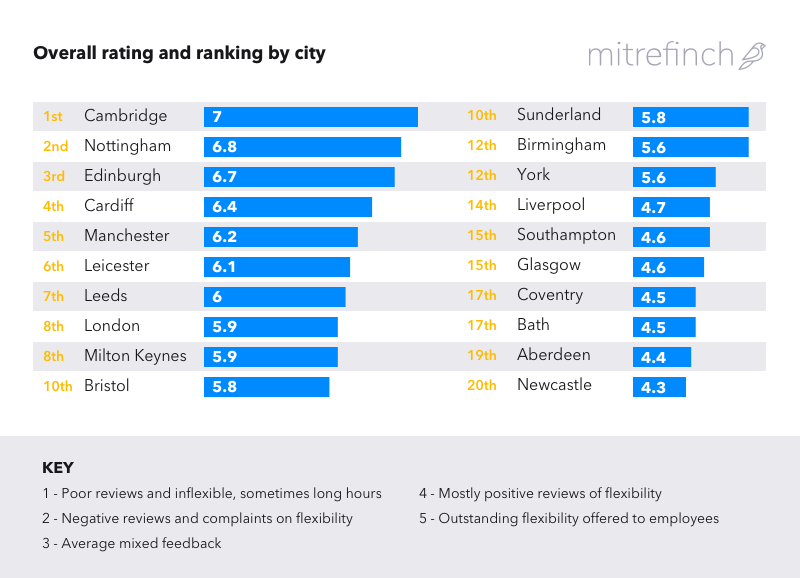
Most opportunities: Cambridge, Nottingham, Edinburgh
Overall, Cambridge scored highly for pharmaceutical, research and engineering firms which gave the city the top scores it required in both flexible and remote working – 7 out of 10 overall.
Nottingham also fared well against other cities in the UK, with 80% of the companies in Nottingham we analysed receiving a score above average for remote working opportunities and 90% of these firms scoring above average for their flexible working practices. 6.8 out of 10 overall.
After performing particularly well in the flexible working category, it was Edinburgh that completed the top three. The Bank of Scotland had the highest performing overall score out of all of the companies featured in the research, receiving the full quota of marks for both remote and flexible working. The city scored 6.7 out of 10 overall.
Fewest opportunities: Newcastle, Aberdeen, Coventry
Newcastle received the lowest score for flexible working and also was among the fewest for remote working opportunities resulting in a total of 4.3 out of ten.
While, as mentioned earlier, companies such as Greggs and Sage are being proactive in employing flexibility for staff where possible, the city is already making great strides to revolutionize itself as Neil Robbins, CEO of Newcastle-based Silverbean and AGY47, explains:
“We went fully flexible with our working environment last year which meant that our people were used to working remotely when they chose to. Newcastle (and the North East as a whole) still hosts many traditional businesses in manufacturing and engineering, though the mix of businesses has been changing over the years as the region becomes a hotbed for digital and technology expertise.
“Those traditional businesses require more ‘hands on’ work, which can only be undertaken at the workplace, whereas places like Cambridge have a greater concentration of biotech and services businesses where remote working is much easier for their employees.”
Aberdeen and Coventry performed slightly better, with overall scores of 4.4 and 4.5 out of ten respectively, however it’s clear that employers in each of these cities may have some changes to make with an impending rise in more flexible working in the future.
| City | Overall Regional Ranking |
| Cambridge | 1 |
| Nottingham | 2 |
| Edinburgh | 3 |
| Cardiff | 4 |
| Manchester | 5 |
| Leicester | 6 |
| Leeds | 7 |
| London | 8 |
| Milton Keynes | 8 |
| Bristol | 10 |
| Sunderland | 10 |
| Birmingham | 12 |
| York | 12 |
| Liverpool | 14 |
| Glasgow | 15 |
| Southampton | 15 |
| Bath | 17 |
| Coventry | 17 |
| Aberdeen | 19 |
| Newcastle | 20 |
The results by industry
Remote working rating by industry
The remote working rating of each industry was scored on the ability of employees to work outside of their usual environment.
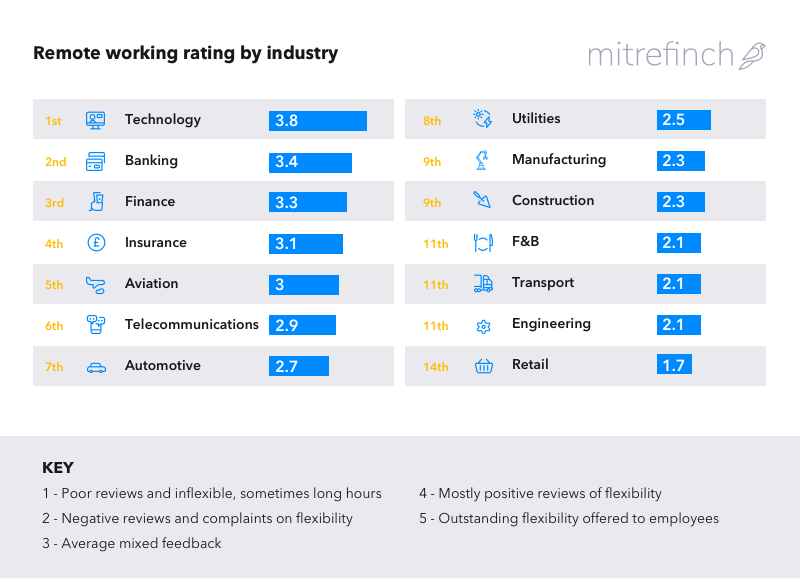
Most opportunities: Technology, Banking, Finance
When looking at the top position for offering remote working to employees the technology sector topped the chart with an average score of 3.8 out of 5. Google and Hewlett Packard (HP) in particular fared well in reviews.
Following closely behind were, perhaps surprisingly to some, the banking (3.4 out of 5) and finance industries (3.3 out of 5).
Commenting on the results, Jenefer Morgan, Head of People, at independent asset manager BOOST&Co, said:
“Firstly, businesses operating in the banking and financial services industry are not creating a physical product; there are no production lines, or requirements for large workshops and storage facilities, and for firms like ours – that are not customer-facing – there is little requirement for a physical presence either. Financial service firms are however, heavily invested in technology. The requirement for secure servers and platforms that host large amounts of sensitive data, influences the role of technology across the rest of the organisation; basic remote-working equipment such as laptops and mobile phones are commonplace, as are digital tools to promote collaboration.
“Financial organisations also tend to be global, or at least national if not multinational. This means these businesses are used to operating across multiple geographies and therefore well-versed with the concept of online meetings and training, as well as actually using digital tools in their normal working day. For example, we have four UK offices and an office in Cape Town; our teams were already used to communicating via Google Hangouts and Slack before the lockdown began, so employees are not now experiencing these tools for the first time.
“For departments that are normally client-facing the transition is particularly difficult, as employees adjust to the transition from face-to-face meetings to video calling. We have also found that remote working has been a substantial change for some of our managers, who are used to being able to reach across a desk to ask a question in normal circumstances. Technology can only do so much; sharing resources about staying focused, productivity and maintaining a good work-life balance are just as important as having all the hardware in place.”
Fewest opportunities: Retail, Transport, Food and Beverage (F&B)
Based on the results of this research, the bottom three for remote working were retail, transport and businesses operating in the food and beverage (F&B) industry.
Our analysis of head offices in the retail sector showed the industry received the lowest scores for remote working, with widespread dissatisfaction across the majority of locations for head office employees in the industry. In fact, at 1.7 out of 5, it was the lowest-scoring metric for the entire study.
However, there were a few exceptions to the rule with Leicester-based fashion retailer Next and Nottinghamshire-based Wilko performing well.
The transport and F&B sectors both finished with average scores of 2.1 out of 5 and highlight the potential challenges both of these sectors face. With a significant focus on customer service, it would be interesting to explore these challenges further as we move past the current lockdown measures – do companies that face a high level of correspondence with the public feel staff should be located within the confines of a physical office?
While the vast majority of transport companies featured in the research received average scores around the 3 out of 5 mark, there were a number of F&B brands that did provide a good level of remote working provisions to staff including Rubicon Drinks, Kelloggs and Mondelez International (the owners of Cadbury).
Flexible working rating by industry
The flexible working rating for each industry was based on hours, analysing how employees are able to alter their start and finish times to suit their needs.
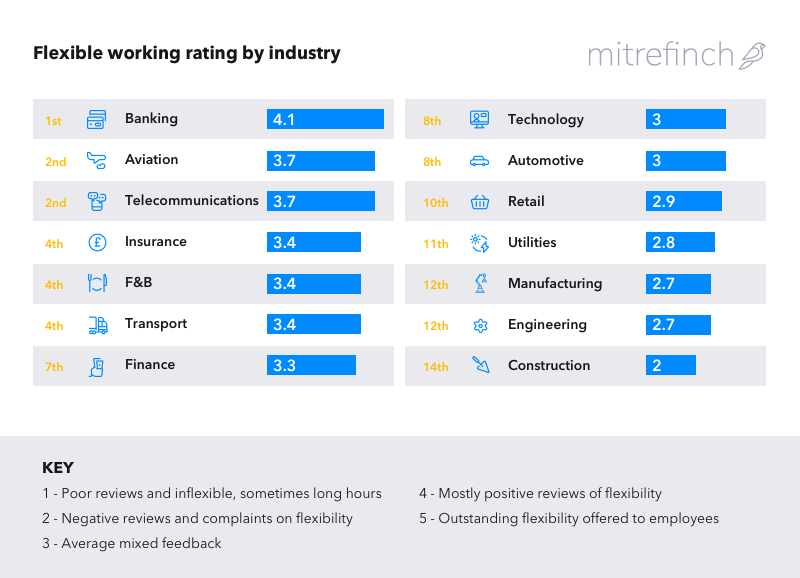
Most opportunities: Banking, Aviation, Telecommunications
The highest scoring industry for flexible working was the banking industry where employees reported a high level of satisfaction with their working hours, annual leave and overtime allowances. This was echoed in job descriptions where employers offered a high level of flexibility to their employees. Businesses within this space scored on average 4.1 out of 5 for flexible working.
In joint second with average ratings of 3.7 out of 5, the aviation and telecommunications sectors also performed well in offering flexible hours to workers. It’s important to note that the businesses operating with the aviation industry researched included the head offices of both commercial airlines (such as Jet2) as well as aircraft manufacturers (such as Airbus UK).
Similarly to the technology sector, it might not be too much of a surprise to see telecommunications fare well in this category. With communication pivotal to the success of flexible working and the ability for staff to control their own schedule, it was reassuring to see brands including BT, EE and O2 perform well in this area.
Fewest opportunities: Construction, Engineering, Manufacturing
Falling in the bottom three were the construction (2 out of 5), engineering (2.7 out of 5) and manufacturing (2.7 out of 5) industries. The construction industry fell short in comparison to other sectors, with employees of some of the UK’s biggest contractors commenting on the need for more flexibility in their job roles.
It’s surprising to see these three sectors appearing here given the fact they did not appear towards the bottom of the ratings for remote working given the hands-on nature of typical jobs across these sectors. However, further testing would be interesting to establish the nature of the reviews analysed to establish if this is a fair reflection of the overall workforce. Construction, engineering and manufacturing-trade professionals may not utilise computers on a daily basis so may be less inclined to complete online reviews.
What is also important to remember that “shift work” is particularly prevalent across all three of these industries, with plants and manufacturing hubs often operating 24 hours a day with staff on rotation, which could explain some of the findings.
That’s not to say the opinions of clerical workers and office staff within these sectors should be ignored, of course.
Overall rating and ranking by industry
Combining the flexible and remote working scores for each industry, we were able to gain an overall total and understanding of the top industry in the UK for flexible and remote working.
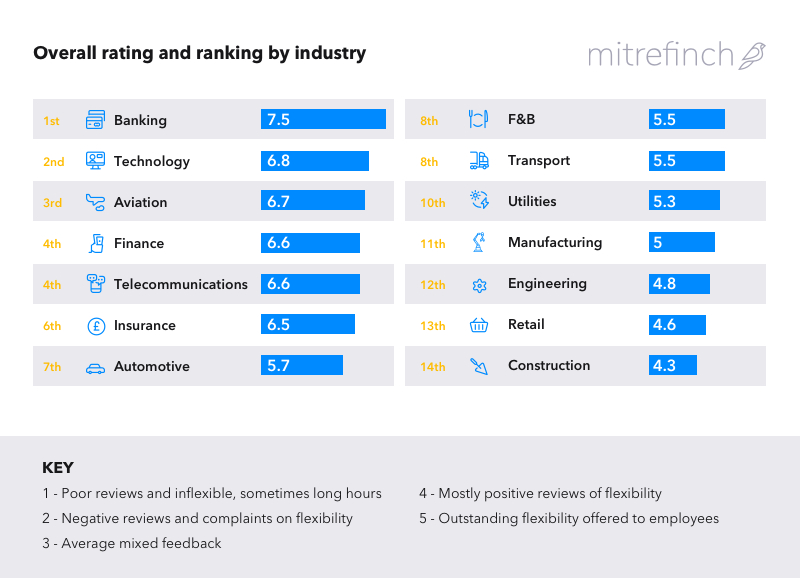
Most opportunities: Banking, Technology, Aviation
Overall, banking (7.5 out of 10) received the highest score for both flexible and remote working. The employee satisfaction rate for both measures was undefeated by any other industry with employees reporting positively on flexible working hours and the ability for their team to work remotely.
Technology (6.8 out of 10) and aviation (6.7 out of ten) followed closest behind suggesting that staff across these industries have more control over their working hours and ways of working when compared to the other sectors featured in this research.
Fewest opportunities: Construction, Retail, Engineering
At the bottom of the rankings for the overall industry-specific rankings was the construction sector (4.3 out of 10), with retail (4.6 out of 10) and (4.8) only marginally ahead.
Mita Patel Product & Development Director at Mitrefinch, had this to say about the results:
“The difficulty with retail and construction industries lies in the traditional nature of the roles. Certain tasks can be challenging to perform remotely which leaves these industries falling behind as others make the shift to remote working.
“However, although surprising to many, there are many jobs in construction which can be done remotely. For instance; building documentation and defect management can be done from anywhere and many administrative tasks can be offloaded to allow managers to use time on site more productively. We are expecting to see a shift like this in these sectors over the next few months.”
| Industry | Overall Ranking |
| Banking | 1 |
| Technology | 2 |
| Aviation | 3 |
| Finance | 4 |
| Telecommunications | 4 |
| Insurance | 6 |
| Automotive | 7 |
| F&B | 8 |
| Transport | 8 |
| Utilities | 10 |
| Manufacturing | 11 |
| Engineering | 12 |
| Retail | 13 |
| Construction | 14 |
What can we all learn from this research?
It is clear that the impending challenges over the coming months for the UKs largest employers across locations and industries will need to be continually monitored and evaluated once the current lockdown is lifted and businesses return to some form of “normal” functionality.
The expectations and questions by many staff, most likely from those that have revelled and enjoyed being able to work from home over the past weeks will likely relate to the why they need to work from an office or certain location and for specific times. Particularly if they have proven themselves to be just as productive, or even more so, by dictating their own time management and ways of working during the lockdown period.
And, while practically remote and flexible working can’t work for every single industry and businesses that operate in it, this period should provide some insight into how every employer can consider their staff and lives outside of work ever more than they already do.
Discover how Mitrefinch can support your business with our cloud payroll and host of workforce management products.




